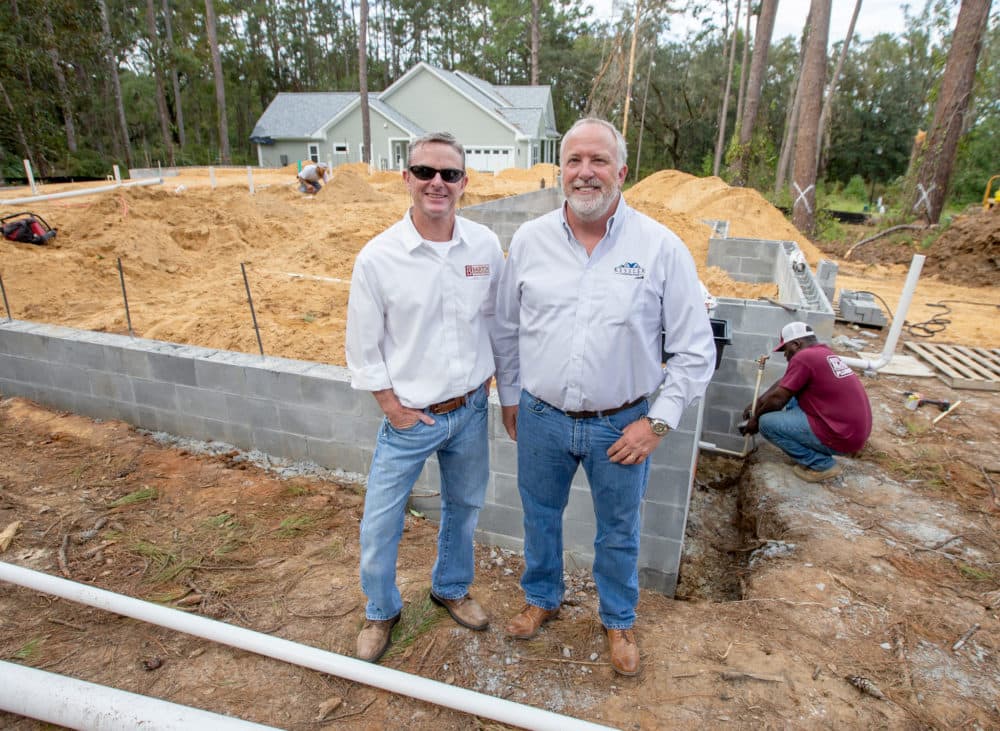Advertisement
2018 Election Road Trip
How Florida Builders Are Trying To Tackle A Construction Worker Shortage

This story was reported on our election road trip to states across the country ahead of the 2018 midterms. Check out all of our election coverage.
People across Florida's Panhandle are starting to return to their storm-damaged communities. In the worst-hit areas — Mexico Beach, Panama City, Apalachicola — rebuilding could take months, and in some cases years. That effort to rebuild is hampered by a severe labor shortage in the state's construction industry.
But Florida is not alone: A recent survey by the Association of General Contractors of America showed that 8 out of 10 of the country's building firms are unable to find the labor they require. But the state is among the country's most affected, with 82 percent of companies saying they'll be hiring in the next year.
Among those feeling the pinch are Mark Kessler of Kessler Construction and Doug Barton of Barton Construction, both of Tallahassee, Florida. They're also members of the Tallahassee Builders Association, which has requests for workers pouring in, according to its executive officer Lynne Edwards.
The problem started, Barton says, with the Great Recession.
"We lost 50 percent of our industry and they haven't returned," Barton says. "They went out and found other work."
Kessler says his company's average-aged framing contractor is 57 years old, and that he's missing people in every area of the trade — drywallers, plumbers, even office staff.
"In the construction industry if you talk to anybody, they're looking for help and they can't find it," he says.
As a result, homes that used to take three to four months to build now take six to eight. That means the bids are higher and customers are impatient, particularly when it appears that the companies just aren't making an effort.
Advertisement
"We struggled day to day to keep up with what we have had prior to the storm," he says. "We're struggling with a balancing act."
In addition to storms and the recession, cuts in legal and illegal immigration are factoring into the shortage. There's been a heavy dependence on immigrant labor particularly after Michael, Kessler says.
"In the construction industry if you talk to anybody, they're looking for help and they can't find it."
Mark Kessler
One of the solutions, according to Barton, is to encourage and facilitate training for students, instead of pushing every teenager into college, which he says "isn't for everyone."
"We're trying to bring them together and tell them, 'In the construction industry, we need you — and it's lucrative,' " Barton says. He adds the high school program Future Builders of America is a good place for kids to start.
Young workers can make upwards of $50,000 to $60,000 a year just repairing air conditioners. Spreading that information and providing training, Barton says, will help build up the workforce.
Another advantage for students is winding up in the labor force debt-free.
When asked what they would like to say to the next Florida governor about the industry — and its tie to immigration policies — Kessler says he'd like them to recognize immigrants' important role in the industry.
"They are very hard workers. Oftentimes the immigrants are ... on the job before anyone else," he says. "They have a work ethic we don't see in our young kids now.
"We need to have a way for these folks to come in and do the work that our industry and other industries need."
Despite increased storms and rising seas, neither Barton nor Kessler say they worry about the future of the Florida building industry.
"I think that Doug and I and other builders build very good homes, with the new code," Kessler says. "Quite the contrary — I think other states should follow our suit and build strong homes."
Kessler says he recognizes that human decisions impact the environment and climate. Barton, however, says he doesn't believe in climate change as a factor driving storms like Michael. He maintains that weather is cyclical, and he anticipates that to continue.
Instead, Barton plans to focus on building strong homes — if he can find the workers to do it.
This segment aired on October 24, 2018.

